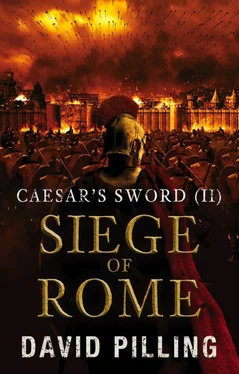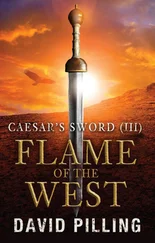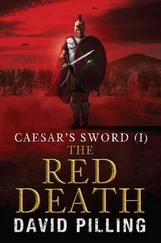David Pilling - Siege of Rome
Здесь есть возможность читать онлайн «David Pilling - Siege of Rome» весь текст электронной книги совершенно бесплатно (целиком полную версию без сокращений). В некоторых случаях можно слушать аудио, скачать через торрент в формате fb2 и присутствует краткое содержание. Год выпуска: 2013, Жанр: Исторические приключения, на английском языке. Описание произведения, (предисловие) а так же отзывы посетителей доступны на портале библиотеки ЛибКат.
- Название:Siege of Rome
- Автор:
- Жанр:
- Год:2013
- ISBN:нет данных
- Рейтинг книги:3 / 5. Голосов: 1
-
Избранное:Добавить в избранное
- Отзывы:
-
Ваша оценка:
- 60
- 1
- 2
- 3
- 4
- 5
Siege of Rome: краткое содержание, описание и аннотация
Предлагаем к чтению аннотацию, описание, краткое содержание или предисловие (зависит от того, что написал сам автор книги «Siege of Rome»). Если вы не нашли необходимую информацию о книге — напишите в комментариях, мы постараемся отыскать её.
Siege of Rome — читать онлайн бесплатно полную книгу (весь текст) целиком
Ниже представлен текст книги, разбитый по страницам. Система сохранения места последней прочитанной страницы, позволяет с удобством читать онлайн бесплатно книгу «Siege of Rome», без необходимости каждый раз заново искать на чём Вы остановились. Поставьте закладку, и сможете в любой момент перейти на страницу, на которой закончили чтение.
Интервал:
Закладка:
“I take my leave,” said the eunuch, “thank you for your hospitality, Flavius. An excellent supper. I must return the favour sometime.”
“I look forward to it,” Belisarius replied without a hint of sincerity. He and Mundus rose and bowed respectfully as Narses limped out of the room, followed by his slave.
When the doors had closed, Belisarius subsided gratefully onto his couch and stretched out his long legs. All the strain and tension in the air dissolved.
“Thank God for that,” he groaned, passing a hand over his face, “if the little swine had stayed much longer, I might have thrown him out of the window.”
“Why did he come, anyway?” demanded Mundus, “he talked of nothing but trivialities over supper. Every time I mentioned Italy, he changed the subject.”
Belisarius nodded at me. “Narses used our tame Briton to humiliate Theodora, but not had seen him since he was carried from the arena. I made sure of that. He wanted to know if Coel was still alive and whole, and if he could still be used. Now he knows.”
Mundus’s little eyes raked over me. “Your enemies multiply, Briton,” he said, “Narses referred to himself. You should have given him the sword.”
“It is mine, sir,” I said defensively, “all I have in the world. Without Caledfwlch I am nothing.”
“Narses will take it from you, if he can,” said Belisarius, “I know that scheming little imp. He craves power, spends every waking hour thinking of ways to obtain it. With Caesar’s sword in his hand, there would be no limit to his ambition. Can you imagine him perched on the throne?”
For the first time in weeks I laughed. The effort hurt my jaw, but I was glad of something to lift the clouds gathering over my head.
Belisarius and Mundus spent the next hour discussing the war. I listened avidly.
Justinian had hatched a plan whereby the Romans would attack Italy on two fronts. Mundus would lead the army west and invade Dalmatia, which was held by the Goths, hoping to leech the strength of the enemy by forcing them to defend their eastern province. Meanwhile Belisarius and the Roman fleet would sail south-west, officially to reinforce the Roman garrisons in Africa, but in fact to seize the island of Sicily.
“Sicily will be our stepping-stone to the Italian mainland,” said Belisarius, “our forces shall be likened unto a spear, thrust into her soft underbelly.”
He grinned at my expression. “Well, that is how the Emperor put it. He is something of a poet, and can turn a decent phrase on occasion.”
“What do you make of our plan?” he asked, again watching me closely. I seemed to fascinate these Romans, who regarded me as a relic from some distant world. Their forefathers had lost control of Britain generations ago, and I sometimes wondered if my presence served as a reminder – not always a welcome one – of the diminished Empire’s glorious past.
I pondered before answering. By now I was well into my third cup of wine, but even the heady glow of alcohol failed to fill me with optimism.
“If you can conquer North Africa with a mere fifteen thousand men, sir,” I said carefully, “then you can certainly repeat the feat elsewhere.”
“A shame, then,” said Belisarius, “that I won’t have fifteen thousand men. The Emperor has given me no more than twelve thousand for the task. Four thousand foederati troops, three thousand Isaurians, some Hunnish and Moorish cavalry, and my bucelarii.”
My spirits sank. How many warriors could the King of the Goths muster – forty, fifty thousand? And he could call on the support of his kin in Frankia, Hispania and Germania. If I was of a paranoid disposition, I might have suspected the Emperor of deliberately sending Belisarius to his death.
Yet my only chance of survival was to accompany this suicide mission. With the likes of Narses and Theodora for enemies, my life in Constantinople was not worth a straw.
“Twelve thousand men,” I said, “and one Briton.”
3.
It took months to re-assemble the imperial fleet, and muster armies for the invasion of Dalmatia and Sicily. Spring passed into summer, and all that time I was kept under guard at Belisarius’ house. He had taken a great risk in moving me from the sanatorium, and only done so because I was no longer safe there.
“Not even Theodora’s assassins,” he assured me, “would think of trying to force entry into my house. Not, at least, while I stand high in the favour of the Emperor.”
That favour depended on continued military success. Justinian was a fickle creature, and susceptible to the whispered asides of his courtiers. He was already envious of his general’s exploits in Syria and Africa, and for a time entertained suspicions that Belisarius meant to sever ties with the Empire and declare himself King of an independent African province. Only Belisarius’ speed in returning to Constantinople and protesting his innocence had cleared him of the taint of treason.
For now, with the laurels of recent victories still fresh on his brow, Belisarius was all but untouchable. Even so, he was not fool enough to presume on his current popularity, and made efforts to deter Theodora’s agents. The six Huns who protected me during my convalescence remained at their posts at the sanatorium, guarding an empty room. Meanwhile I was ordered to remain indoors at all times in his house.
This suited me for the time, for I was still weak from my injuries. Belisarius treated me well, and I enjoyed the best of rations from his kitchen. He employed a master-at-arms to spar with me, until my confidence returned and my right arm had regained its strength.
The general himself was often absent, either at the palace or overseeing preparations for war. As before the African campaign, he was drilling his troops on the plains outside the city walls, while the fleet that carried us home was being re-fitted in the harbour of the Golden Horn.
A similar number of ships were needed to take the army to Sicily, transports and dromons for the most part, along with a few galleys. I pictured the feverish bustle of activity in the harbour, hundreds of hired Egyptian and Syrian sailors and engineers toiling in the summer sun, and groaned at the prospect of another sea-voyage. I was a wretched sailor, a martyr to sea-sickness, and had barely survived the journey to Africa.
The long days of rest and inactivity did nothing to ease my mind. Fears gnawed at me in the evenings, when shadows crept slowly through the gaps of the shuttered windows and oiled into my bedchamber. I was acutely aware that only the friendship of Belisarius stood between me and destruction. He was an honourable man, but had his weaknesses, chiefly his slavish adoration of Antonina.
Antonina had tried to seduce me in Carthage, as part of a foul plot to disgrace me in the eyes of her husband. I resisted her, but had lived in terror since that she might feed some twisted version of the incident to Belisarius, claiming that I had tried to force myself on her. So far that particular axe had not fallen, but remained suspended over my neck.
I sat and sweated in the growing darkness. Caledfwlch was my only comfort. I often hugged the blade to my chest, as though willing its hard-forged steel into my quaking soul. Sometimes I thought I could hear the screams of all its victims down the centuries, and pictured the hell of Mount Badon, where my grandsire personally laid low hundreds of Saxons in a single charge.
My ordeal ended in the dying days of summer. Belisarius came to his house one evening, exhausted from his labours, and announced that the expedition was ready to sail.
“Mundus has departed for Dalmatia,” he said over supper, “along with his son Maurice and ten thousand men. Their object is the Gothic capital, Salona.”
Читать дальшеИнтервал:
Закладка:
Похожие книги на «Siege of Rome»
Представляем Вашему вниманию похожие книги на «Siege of Rome» списком для выбора. Мы отобрали схожую по названию и смыслу литературу в надежде предоставить читателям больше вариантов отыскать новые, интересные, ещё непрочитанные произведения.
Обсуждение, отзывы о книге «Siege of Rome» и просто собственные мнения читателей. Оставьте ваши комментарии, напишите, что Вы думаете о произведении, его смысле или главных героях. Укажите что конкретно понравилось, а что нет, и почему Вы так считаете.












